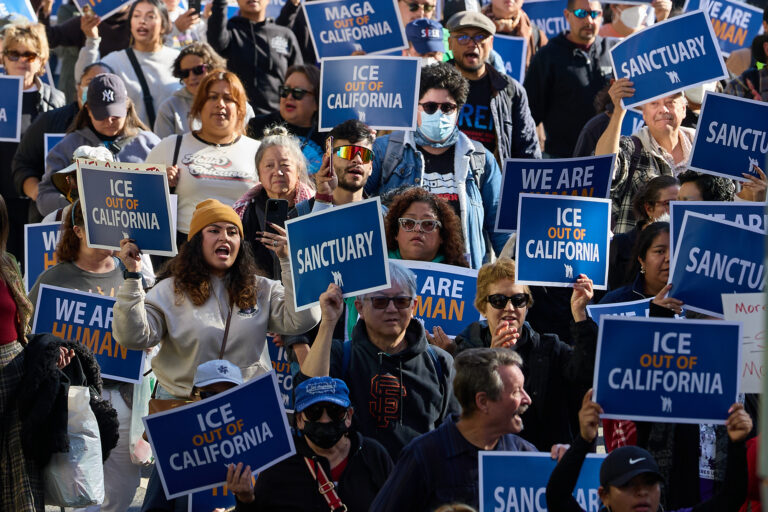California’s Immigrant Policies Under Scrutiny as Trump Returns
By Yue Stella Yu, CalMatters
The Shift in Democratic Rhetoric
In 2017, Governor Gavin Newsom, then lieutenant governor, strongly advocated for sanctuary policies to protect unauthorized immigrants amid threats from the Trump administration. He criticized fellow Democrats for their reluctance, stating, “What the heck is wrong with the Democratic Party that we don’t have the courage to stand up for it?” His previous experience as mayor of San Francisco, known for its limited cooperation with federal immigration enforcement, reinforced his stance.
However, in the face of Trump’s renewed threats of mass deportations and stringent immigration policies, Newsom’s current approach appears more cautious. He has refrained from using the term “sanctuary” and has previously vetoed legislation that sought to expand protections for immigrants in state custody. This shift reflects a broader trend among California Democrats to maintain existing immigrant protections without aggressive expansions, especially in light of changing voter sentiments surrounding immigration.
Political Risks and Voter Sentiment
Recent polling indicates a significant shift in public opinion, with more than half of Americans advocating for decreased immigration—a perspective that hasn’t been seen since 2005. This sentiment appears to influence Democratic leaders as they balance the support from their base with growing calls for tougher immigration policies.
Democrats’ silence on sanctuary issues may be strategic, as they aim to avoid alienating voters amidst perceived rightward shifts in public opinion. Local Republican lawmakers are seizing this opportunity, proposing legislation that would prohibit local jurisdictions from enacting stricter sanctuary policies than those established by the state in 2017.
Internal Conflicts Within the Democratic Party
Some state lawmakers argue that hesitation in defending immigrant rights could jeopardize electoral outcomes. Loren Collingwood, a political expert, notes that by not articulating a strong stance against Trump’s policies, local officials risk facing challenges in primaries or reelections due to perceived inaction on immigration.
Progressives within the party have voiced frustration over this tendency to retreat from bold positions. San Jose City Councilmember Peter Ortiz expressed disappointment, asserting, “Now is not the time for Democratic leadership to second guess what’s right.” He emphasized that moral standing, rather than populism, should guide actions on such crucial issues.
Understanding Sanctuary Policies
The term “sanctuary” lacks a legal definition but generally refers to policies that limit local cooperation with federal immigration enforcement. Its politicization intensified under Trump, leading California to adopt a sanctuary state law in 2017, which prohibits most state and local entities from aiding federal immigration authorities, excluding cases involving certain serious crimes.
Angela Chan, assistant chief attorney at the San Francisco Public Defender’s Office, explains that the sanctuary movement aims to protect immigrant communities from federal overreach, especially during the Trump presidency if he attempts large-scale deportations and legal actions against non-compliant officials.
Implications of Federal Threats
California cities are currently re-evaluating their policies in anticipation of a more aggressive federal stance on immigration following Trump’s return to the White House. The potential financial implications are substantial; federal funding could be withheld from sanctuary cities, crippling budgets that depend heavily on these resources.
Furthermore, local authority figures, while reaffirming their sanctuary policies, have expressed a need to differentiate between serious offenders and law-abiding residents. Statements suggesting that only violent criminals should face deportation have drawn criticism for potentially reinforcing negative stereotypes about immigrant communities.
Looking Ahead
As the political landscape shifts, California Democrats must navigate the complexities of immigration reform while staying true to their foundational principles. While recent events have prompted some leaders to reconsider their positions, the stakes in terms of community trust, electoral viability, and the moral imperative of protecting vulnerable immigrants remain high.
Political experts predict that how Democrats respond to Trump’s policies will significantly affect their relationship with immigrant communities and their overall electoral success. Maintaining a strong stance on immigrant protections may be critical as they strive to reestablish their credibility and commitment to civil rights in a changing political environment.
This article was originally published by CalMatters and is republished under the Creative Commons Attribution-NonCommercial-NoDerivatives license.



